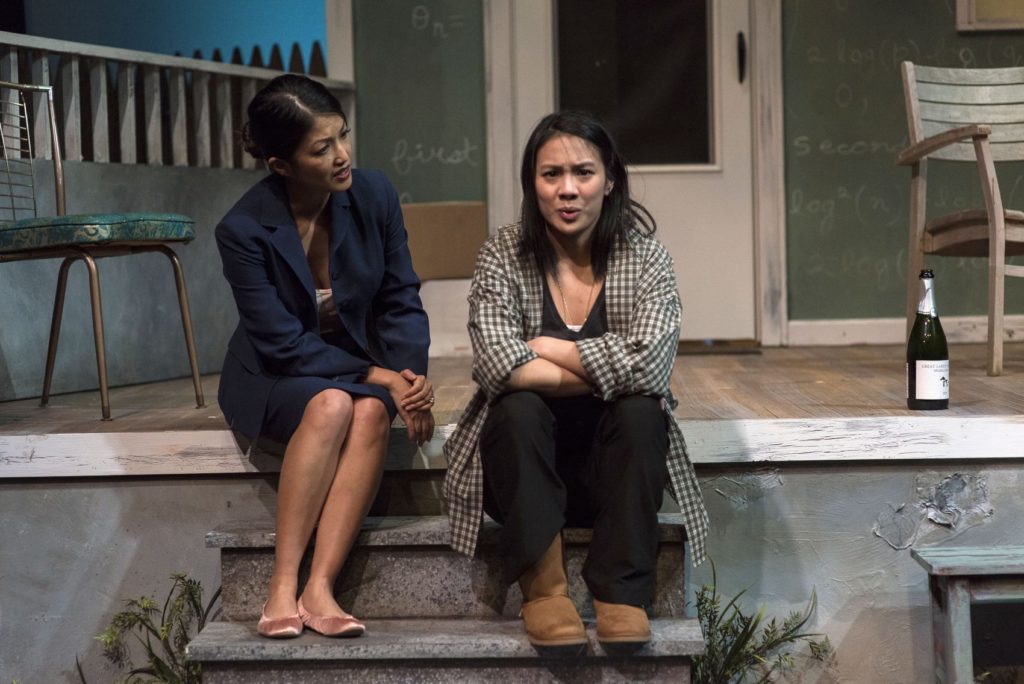Proof, an authorial dispute: Performing plays that bring a new understanding to science.

Proof, David Auburn’s Pulitzer Prize winning play, now being presented by the Nora Theatre Company at the Central Square Theatre in Cambridge, MA, is in theory about the world of mathematics. However, presumably influenced by Auburn’s lack of knowledge of the topic, this four-hander explores family problems and clichés about mathematicians rather than mathematics.
The literary history of the mad scientist, one of Proof’s main themes, goes back at least to Mary Shelley’s Frankenstein in the early nineteenth century. Catherine, a mathematically gifted young woman, gave up her studies at Northwestern University to care for her brilliant and famous father when he lost his ability to function mentally. She fears the same fate. In the first scene, she and her father Robert celebrate her twenty-fifth birthday and talk confidentially before he announces that he is dead.
Catherine’s sister Claire flies to Chicago from New York for the funeral and to take charge of the estate and Catherine. Their relationship is extremely awkward. The fourth character is Hal, a young math professor, whose PhD thesis was supervised by Robert. With Catherine’s permission, he has been reading through Robert’s notebooks in the hope of finding important discoveries that he can use to advance his own career. Both he and Catherine are drawn to each other and an affair begins, only to be aborted when Hal disappoints her. Catherine shows Hal a proof she has written and he refuses to believe that it is her work. But all’s well that ends well and the two develop trust, proof of Robert’s love and Catherine’s developing confidence. Claire returns to New York.
The action, which moves back and forth in time, takes place on the shabby porch of the family home, an old house near the University of Chicago where Robert had taught. Faded mathematical writings cover the outside walls of the house. Dead leaves fill the yard in front of the porch, perhaps signifying the demise of Robert.
While the script makes clear that Catherine suffers from depression, in Lise Nguyen’s performance she is often underplayed. Cheryl Daro’s Claire is a stylishly dressed, successful business woman who under her guise of self-assurance is jealous of her sister’s intellectual gifts.
When I first discovered that all the actors except Avery Bargar, the production’s Hal are Asian, I was taken aback. Was the Nora Theatre presenting stereotypes? In the program artistic director Lee Mikeska Gardner explains that when the choice was made to stage Proof, all those concerned discussed whether a “well-made play” that is also a family drama and a mystery as well as a work that deals with math was strong enough to meet the criteria set up by the theatre and MIT. That is performing plays that try to bring a new understanding of science to their audiences while raising and discussing social and ethical matters. The Asian artists they spoke to were highly enthusiastic and offered their ideas on why the plan was valid.
Proof plays through February 18 at the Central Square Theatre.
Written by David Auburn
Directed by Michelle M. Aguillon
Scenic Design by Janie E. Howland
Costume Design by Leslie Held
Lighting Design by Allison Schneider
Sound Design by Grant Furgiuele
Cast
Robert ……………Michael Tow
Catherine …………Lisa Nguyen
Hal ……………….Avery Bargar
Claire …………….Cheryl Daro